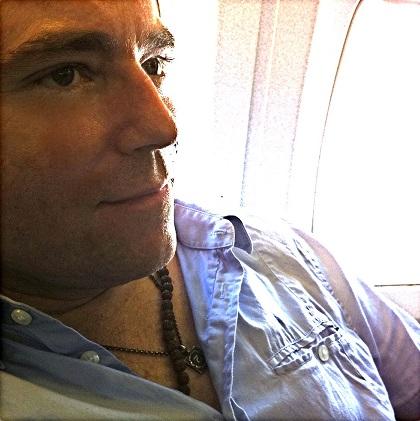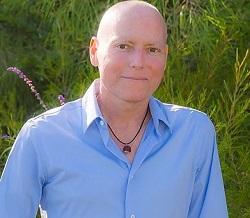Jeff Forrester on Sam Harris

“The president of the United States has claimed, on more than one occasion, to be in dialogue with God. If he said that he was talking to God through his hairdryer, this would precipitate a national emergency. I fail to see how the addition of a hairdryer makes the claim more ridiculous or offensive.”
– Sam Harris, Letter to a Christian Nation

Beezone Note:
This article was originally published on Jeff Forrester’s website JLForrester.org which is no longer ‘live’. The essay was written in 2011 four years prior to Jeff’s death. It is now 9 years later and as Jeff prophesies, Sam has risen to heights far above his cultural visibility when this was written.
***
![]() first met Sam Harris at a Manhattan loft party in ’86. I think he was nineteen, I was twenty. He’d gone to high school with my younger brother and since we shared a fierce interest in Eastern spirituality, my brother felt we should meet. We talked over beer and city lights, and have been friends ever since.
first met Sam Harris at a Manhattan loft party in ’86. I think he was nineteen, I was twenty. He’d gone to high school with my younger brother and since we shared a fierce interest in Eastern spirituality, my brother felt we should meet. We talked over beer and city lights, and have been friends ever since.
In the 90s, Sam spent years on a kind of extended solo retreat, writing voraciously in a house he’d built in a remote desert area. He’d occasionally send me bound paper drafts of his work to look over, and it was… very close to unreadable. I had some actors from upstate New York living with me at the time, trying to make it in Hollywood. They used to take Sam’s latest manuscript off the coffee table during parties and recite it in turns with dramatic air, as if it were a Shakespearean play. Spoken as drama, It sounded like fantastical gibberish. They knew they’d found comedic gold, and “Harris Theater” became a staple of our household.
Reading it alone, I could barely follow the language myself. The depth and complexity of Sam’s thought raised my tortured memory of Wittgenstein. I always wondered if he’d ever be able to speak plainly to actual humans. But I always gave him positive reviews. Clearly, he would now consider this lying, but as I’m cleaning the slate now, I hope he’ll forgive it. To be sure, I knew he was a genius trying to and his way with language and voice.
In 2000, my guru Adi Da lived in a house in Brentwood briefly, granting his darshan to small groups of people on a more or less daily basis for months. For all kinds of reasons, I felt Sam had to see my master. I sent in a letter asking permission for him to come. It was granted, and a week later, I got to witness a sight I’m sure Sam’s present-day followers would be absolutely astonished to see: Sam Harris, offering flowers at the feet of a guru seated cross-legged on an ornate chair, then prostrated at with his forehead on the floor before him.
I was curious to see Adi Da’s response to Sam. It was remarkably intense. I could not see Sam, but I did see my guru lock eyes with him, in a loving and concentrated gaze that lasted quite a while between them. I mention this not to say that Sam is a devotee. He practices meditation in a more traditionally Buddhist context, but outside of any formal Buddhist community or sangha.
In any case, after that encounter, Adi Da presumed a real and lasting relationship to Sam. He asked about Sam often . In fact, so often that I presumed Sam had some kind of crucial role to play in the spiritual work Adi Da was always doing. Still, I was never quite sure what would become of Sam. Then 9/11 happened.
The event impacted Sam profoundly. His visceral response to injustice is notoriously acute, and he’s not a man to be tried with. Sam picked up his weapon of choice, and wrote what became “The End of Faith“. His book was an instant bestseller, and won him the Pen Award for best non-action of the year. More importantly, it propelled Sam into the epicenter of one of the most urgent cultural dialogs of our time: The proof – or mostly disproof – of religion.
After “The End of Faith”, Sam finished a PhD in neuroscience at UCLA, and he’s since become perhaps the world’s foremost new atheist intellectual, the youngest of the so-called “Four Horsemen” of this movement, along with ethologist and evolutionary biologist, Richard Dawkins; philosopher and cognitive scientist, Daniel Dennet; and kick-ass, humorous journalist, Christopher Hitchens.
Oddly, Sam doesn’t even consider himself an atheist, feeling it’s perhaps too narrow a term. And despite a reputation for his scathing critique of religion, he’s probably far more broad-minded than his 100,000-plus followers on Facebook and Twitter might imagine. He still meditates, goes on extended retreat, considers seriously the virtues and vices of psychotropic drugs, and writes pieces for the Shambhala Sun. And he treats science mostly the way it should be treated: as a methodology, not an ideology.
These “Four Horsemen” mentioned above are people who I feel the spiritually-minded among us must seriously contend with. The upshot of the conversation they’ve begun may largely determine the future of our planet and the survival of the human race. If you have the time, watch this two-part video series to get a sense of what they’re up to: (Watch part 2 here.)
You might think the guru tradition is as far from the land of Dawkins, Hitchens and the talk above as it could possibly be. But it’s not. Adi Da had a tremendous regard for Sam during his lifetime – and most especially with respect to the work Sam is doing to bring religion to a rather cold public account. He put Sam’s work into the highest category of his collection of global spiritual writings that document humanity’s spiritual experience – the Epitome of Seventh Stage Traditional Esotericism, which is a small subset of books in “The Basket of Tolerance”, a collection that itself contains upwards of 20,000 titles. Sam’s books traveled with Adi Da personally everywhere he went.
Adi Da also said that Sam was the only trustable voice in the mainstream media (along with John Stewart) and he asked me to show the films of all Sam’s public debates and interviews to members of our ashram in California. I believe Adi Da saw that Sam would be a key figure in the future undermining, and ultimate release, of global religious bondage.
And I put Harris as a person of interest on this site because his work has the power to set humanity free from at least one set of its terrible illusions. (Beezone note: The site Jeff is referring to is no longer ‘live’ and therefore many of the reference links are no long available).
Adi Da used to say with regard to exoteric faiths: “Where is the Polaroid?” In other words, on what basis do you believe what you do? Is there any evidence for it at all? If we live through our century, I feel we’ll see gravitation towards empirically grounded, reality-based spiritual practice. A practice that requires no belief, no clerics, no ancient laws, no moral mandates from scripture, and no objective deity – no matter how loosely or imaginatively conceived. To start with a truly clean slate, this is where we must begin.
And that is why I put “The End of Faith” as the first of the books on my list of semi-required reading. I’ll leave you with a question and answer video that Sam recently made. It will give you a good sense of his personality, his interests, and his work. Although people feel he’s at the height of his powers and career right now, he’s not. He’s actually mid-way, and will overshadow the work of all three of his collaborators within the next decade.
You heard it here first (written in 2011).
“What I’m asking you to entertain is that there is nothing we need to believe on insufficient evidence in order to have deeply ethical and spiritual lives.”

Jeff Forrester
Read more about Jeff Forrester on Beezone
A tidbit on Guru’s from Sam and Adi Da
“The notion that one is incapable of making mistakes poses obvious ethical concerns, no matter what one’s level of realization. Anyone who has studied the spread of Eastern spirituality in the West knows that these elephants often stumble – even stampede – injuring themselves and many others in the process.” – Waking Up: A Guide to Spirituality Without Religion – Sam Harris
“The question comes down to, what it really is, is an expression of doubt. If I Am you, there does not have to be any way it works! There is not any difference between us to need something to work. So I have completely accounted for what you are asking about. It is just that My answer is not satisfying to the egoic mind. Only in the mode of Communion with Me, direct Realization in My Company, would you be satisfied by some of these descriptions. As long as there is that knot in the heart, then What is Great is not perceived, and so you look for signs, structures, to open the heart, to relieve you of yourself so you can see plainly.” – October 22, 1984, Adi Da Samraj